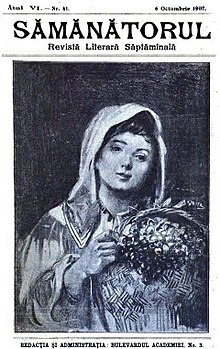Sămănătorul

Sămănătorul issue, cover dated October 6, 1907
|
|
| Editor | George Coșbuc, Nicolae Iorga, Ștefan Octavian Iosif, Mihail Sadoveanu, Alexandru Vlahuță |
|---|---|
| Categories | literary magazine, political magazine |
| Frequency | weekly |
| Total circulation | approx. 300 |
| First issue | December 2, 1901 |
| Final issue | 1910 |
| Company | Editura Minerva |
| Country | Romania |
| Language | Romanian |
Sămănătorul or Semănătorul (pronounced [səmənəˈtorul / semənəˈtorul], Romanian for "The Sower") was a literary and political magazine published in Romania between 1901 and 1910. Founded by poets Alexandru Vlahuță and George Coșbuc, it is primarily remembered as a tribune for early 20th century traditionalism, neoromanticism and ethnic nationalism. The magazine's ideology, commonly known as Sămănătorism or Semănătorism, was articulated after 1905, when historian and literary theorist Nicolae Iorga became editor in chief. While its populism, critique of capitalism and emphasis on peasant society separated it from other conservative groups, Sămănătorul shared views with its main conservative predecessor, the Junimea society, particularly in expressing reserve toward Westernization. In parallel, its right-wing agenda made it stand in contrast to the Poporanists, a Romanian populist faction whose socialist-inspired ideology also opposed rapid urbanization, but there was a significant overlap in membership between the two groups. Sămănătorul's relationship with the dominant National Liberal Party was equally ambiguous, ranging from an alliance between Sămănătorul and National Liberal politician Spiru Haret to Iorga's explicit condemnation of 20th century Romanian liberalism.
...
Wikipedia
